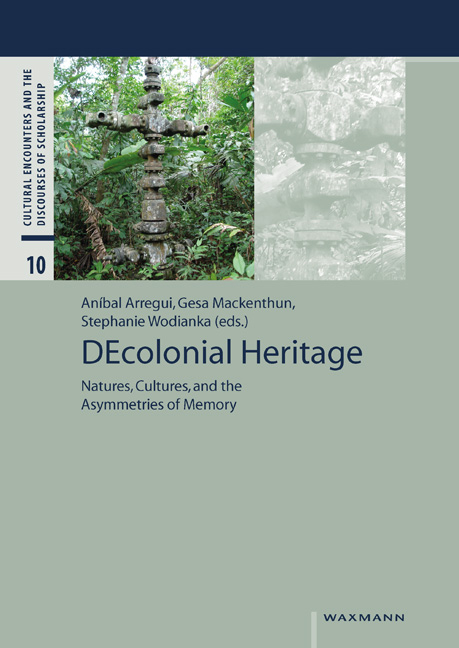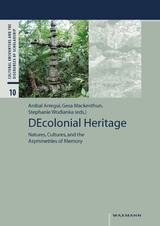DEcolonial Heritage
Waxmann (Verlag)
978-3-8309-3790-6 (ISBN)
The volume attempts to triangulate three vibrant discourses of our times: It combines postcolonial and decolonial readings of cultural conflicts with assessments of ecological dimensions of those conflicts, as well as their significance within discourses on natural and cultural world heritage. The examples from four continents range from the medieval Middle East - already shaken by a convergence of ecological and social disaster - to modern imaginary constructions of medieval Vikings, the persistence of Indigenous knowledge in the Arctic, literary poetics of patrimony, and the heritage politics of Mediterranean urban architecture. Authors ask which strategies societies in developing countries use to defend their cultural and ecological uniqueness and integrity while being penetrated by environmental hazards and hegemonizing 'Western' forms of heritage culture; or how western societies construct their own past in ways that are sometimes reminiscent of traditional imaginations of a pre-modern past, petrified eternally in an 'ideal' moment of time. Colonial and historical forms of 'heritagization' of human and non-human environments, the essays show, answer to pressing emotional needs for a sense of stability. But the desire for nostalgia, frequently commodified, tends to collide with the similarly pressing need for political and economic survival in a rapidly changing world and in the face of accelerating extraction practices. Without being able to solve this dilemma, the volume makes an interdisciplinary contribution to taking intellectual stake of the asymmetrical politics and poetics of heritage and collective cultural memory.
Hans-Jürgen Lüsebrink is Professor of Romance Cultural Studies and Intercultural Communication at Saarland University. He holds a PhD in Romance Philology (Bayreuth, Germany) and in History (EHESS, France) and is co-director of the International Research Training Group Diversity: Mediating Difference in Transcultural Spaces. His research fields concern cultural transfers between France and Germany and between Europe and non-European societies, conceptual history, francophone literatures and medias (Québec, Sub-Saharan Africa), and the theory of intercultural communication. Recent books: (co-edited with Christoph Vatter): Multiculturalisme et diversité culturelle dans les médias au Canada et au Québec (2013); (co-edited with Aurélien Boivin and Jacques Walter): Régionalismes littéraires et artistiques comparés. Québec/Canada – Europe (2014); Le livre aimé du peuple. Les almanachs québécois de 1777 à nos jours (2014); (co-edited with Marc-André and Clorinda Donato): Jesuit Accounts on the Colonial Americas. Intercultural Transfers, intellectual Disputes, and Textualities (2014); (co-edited with Sylvère Mbondobari): Villes coloniales/métropoles postcoloniales. Représentations littéraires, images médiatiques et regards croisés (2015); (co-edited with Michel Espagne): Transferts de savoirs sur l’Afrique (2015).
Gesa Mackenthun is Professor of American Studies at RoStock University, Germany. Her publications include Fictions of the Black Atlantic in American Foundational Literature (2004), Metaphors of Dispossession. American Beginnings and the Translation of Empire, 1492–1637 (1997), and Sea Changes. Historicizing the Ocean (co-edited with Bernhard Klein, 2004). In 2006, she founded the graduate school “Cultural Encounters and the Discourses of Scholarship” at RoStock University (German Research Foundation) and has co-edited seven research volumes on various aspects of this problematic (including Entangled Knowledge. Scientific Discourses and Cultural Difference, 2012, and Fugitive Knowledge, 2015). Her current research deals with nineteenth-century travel and archaeology and the scientific construction of American antiquity.
Jürgen Vogt ist Professor für Erziehungswissenschaft unter besonderer Berücksichtigung der Musikpädagogik an der Universität Hamburg. Seine Arbeitsschwerpunkte liegen im Bereich Musikpädagogischer Erziehungs- und Bildungsphilosophie.
Stephanie Wodianka is Professor of Romance Literature at RoStock University, Germany since 2010. Her research interests – documented in several monographies and books – include representations, practices and theories of the collective memory (littérature, films, chanson française), the European meditative literature of the seventeenth century, the relations between aesthetics and the construction of (trans)cultural identities (especially in the context of the Grand tour), and concepts and poetics of modern myth. Since 2013 she has been chairing the interdisciplinary doctoral program on Cultural Encounters and the Discourses of Scholarship, and she is currently working on a project on cultural semiotics of the cardinal directions, Localisations de l’Europe: sémiotiques culturelles des points cardinaux, edited by Stephanie Wodianka and Sebastian Neumeister (2016).
A strength of the volume is that it shows that the relationships between (de)colonialism, the environment and heritage are both fertile and fragile. Like the relationships between humans and nonhumans in indigenous traditions, they must be thoughtfully tended and cultivated. [...] The volume sheds light on the Complexity and richness of heritage and the environment; it raises many urgent questions and provides a few possible solutions. It will appeal to anthropologists, folklorists, sociologists, geographers, environmentalists and, indeed, to anyone interested in understanding our fluid, multicultural world. – Tiziana Soverino, in: Anthropological Journal of European Cultures 1/2019, S. 109f.
| Erscheinungsdatum | 13.04.2018 |
|---|---|
| Reihe/Serie | Cultural Encounters and the Discourses of Scholarship ; 10 |
| Co-Autor | Aníbal Arregui, Romeo Carabelli, Ronnie Ellenblum, Ferran Estrada, Kerstin Knopf, John J. Kucich, Laure Lévêque, David Lowenthal, Hans-Jürgen Lüsebrink, Gesa Mackenthun, Camila del Mármol, Peter Probst, Karl Steel, Jürgen Vogt, Stephanie Wodianka |
| Mitarbeit |
Assistent: Lisann Wassermann |
| Sprache | englisch |
| Maße | 170 x 240 mm |
| Themenwelt | Geschichte ► Teilgebiete der Geschichte ► Kulturgeschichte |
| Sozialwissenschaften ► Ethnologie ► Volkskunde | |
| Schlagworte | 18. Jahrhundert • 20. Jahrhundert • 21. Jahrhundert • Afrika • Ann Stoler • David Lowenthal • Epochenübergreifend • Erinnerungskultur • Europa • Kanada • Lateinamerika • Naher Osten • Natur/Kultur • Ökologie • Patrimonie • postkoloniale Studien • Rohstoffabbau • USA • Weltkulturerbe |
| ISBN-10 | 3-8309-3790-3 / 3830937903 |
| ISBN-13 | 978-3-8309-3790-6 / 9783830937906 |
| Zustand | Neuware |
| Haben Sie eine Frage zum Produkt? |
aus dem Bereich




